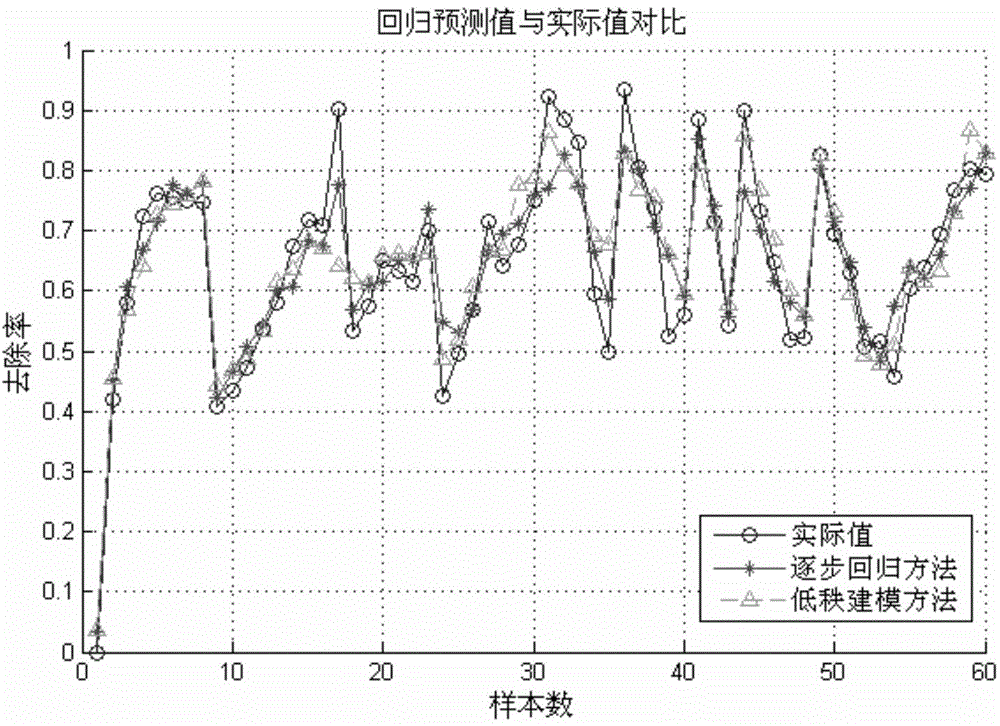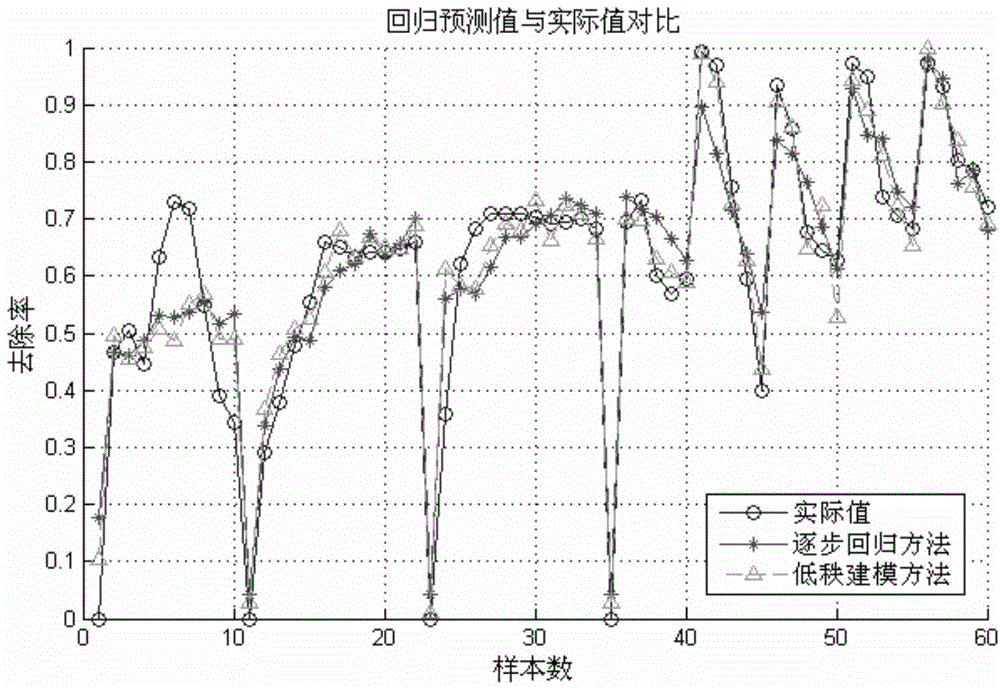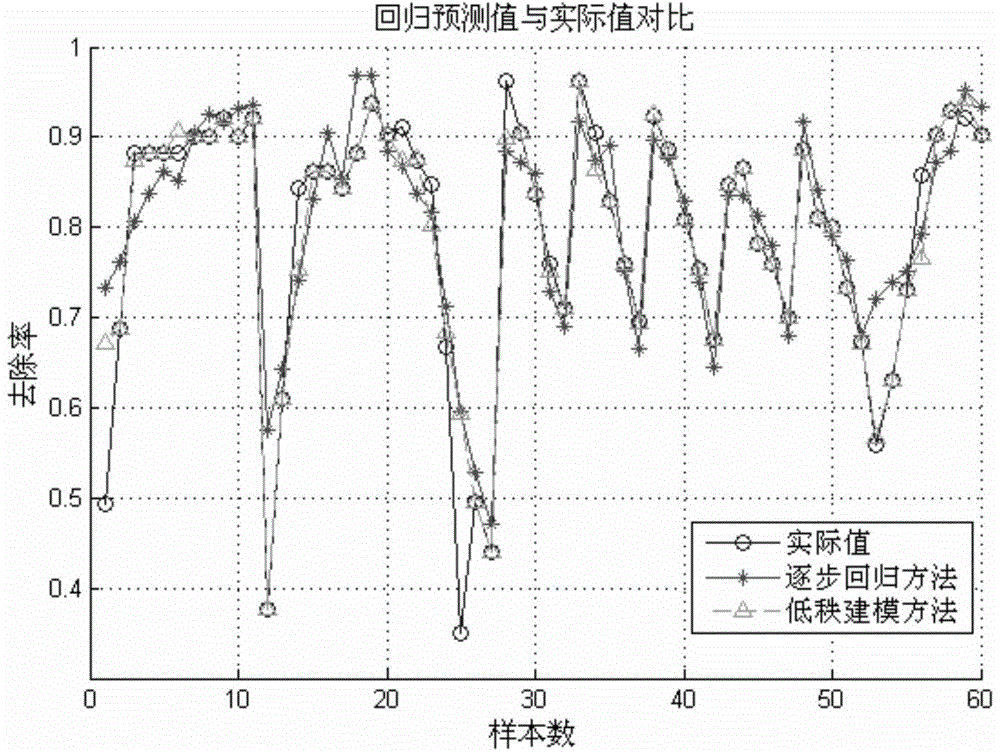Building method of modified bioadsorbent structure-activity relationship model and application thereof
A biosorbent and structure-activity relationship technology, applied in special data processing applications, instruments, electrical digital data processing, etc., can solve the problems of reduced generalization ability, limited ability to describe data information, complex data space, etc., to achieve The effect of shortening the development cycle, avoiding waste of financial and material resources, and improving screening efficiency
- Summary
- Abstract
- Description
- Claims
- Application Information
AI Technical Summary
Problems solved by technology
Method used
Image
Examples
Embodiment 1
[0037] Example 1: SVR model for adsorption of trivalent arsenic ions on inorganically modified wheat grains
[0038] Step A: choose wheat grains, a by-product of the beer industry that is cheap, easy to obtain and rich in lignocellulose, as the raw material for the biosorbent;
[0039] Step B: adopting an inorganic modification method to measure the ability of the modified wheat grains to adsorb trivalent arsenic ions in groundwater, and take the removal rate index of trivalent arsenic ions in water as the adsorption rate;
[0040] Step C: After obtaining the relevant test data, perform test data preprocessing, and make the norm of the data less than 1 after transformation;
[0041] Step D: Select the descriptor type of the molecular structure of inorganic modified wheat grains as a theoretical calculation descriptor, and the generation and calculation of the descriptors are realized through the descriptor calculation system of the E-Dragon software, and 1666 descriptors are g...
Embodiment 2
[0047] Example 2: SVR model for adsorption of trivalent arsenic ions on organic (hydroxyl) modified wheat grains
[0048] Step A: choose wheat grains, a by-product of the beer industry that is cheap, easy to obtain and rich in lignocellulose, as the raw material for the biosorbent;
[0049] Step B: adopt organic (hydroxyl) modification method to measure the ability of modified wheat grains to adsorb trivalent arsenic ions in industrial wastewater, and take the removal rate index of trivalent arsenic ions in wastewater as the adsorption rate;
[0050] Step C: After obtaining the relevant test data, perform test data preprocessing, and make the norm of the data less than 1 after transformation;
[0051] Step D: Select the descriptor type of the molecular structure of organically modified wheat grains as a theoretical calculation descriptor. The generation and calculation of the descriptors are realized through the descriptor calculation system of the E-Dragon software, and 1666 ...
Embodiment 3
[0057] Example 3: SVR model for adsorption of trivalent arsenic ions on organic (amido) modified wheat grains
[0058] Step A: choose wheat grains, a by-product of the beer industry that is cheap, easy to obtain and rich in lignocellulose, as the raw material for the biosorbent;
[0059] Step B: adopt the PAM modification method containing amide groups, measure the ability of the modified wheat grains to adsorb trivalent arsenic ions in industrial wastewater, and use the removal rate index of trivalent arsenic ions in the wastewater as the adsorption rate;
[0060] Step C: After obtaining the relevant test data, perform test data preprocessing, and make the norm of the data less than 1 after transformation;
[0061] Step D: Select the descriptor type of the molecular structure of PAM-modified wheat grains as a theoretical calculation descriptor. The generation and calculation of the descriptors are realized through the descriptor calculation system of the E-Dragon software, an...
PUM
 Login to View More
Login to View More Abstract
Description
Claims
Application Information
 Login to View More
Login to View More - R&D
- Intellectual Property
- Life Sciences
- Materials
- Tech Scout
- Unparalleled Data Quality
- Higher Quality Content
- 60% Fewer Hallucinations
Browse by: Latest US Patents, China's latest patents, Technical Efficacy Thesaurus, Application Domain, Technology Topic, Popular Technical Reports.
© 2025 PatSnap. All rights reserved.Legal|Privacy policy|Modern Slavery Act Transparency Statement|Sitemap|About US| Contact US: help@patsnap.com



